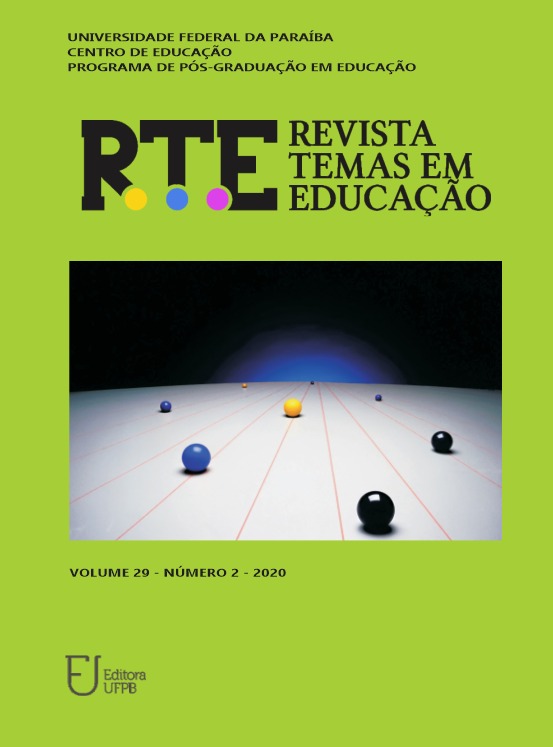THE POLITICAL-PEDAGOGICAL PROJECT AS A GUIDING PRINCIPLE OS SCHOOL PRATICES
THE POLITICAL-PEDAGOGICAL PROJECT AS A GUIDING PRINCIPLE FOR SCHOOL PRATICES
DOI:
https://doi.org/10.22478/ufpb.2359-7003.2020v29n2.52963Keywords:
Collective participation, Pedagogical Political Project, Teaching learningAbstract
This study aims highlight the importance of building and consolidating the actions contained in the Political Pedagogical Project (PPP) for the better development of school activities, with the goal training of critical and reflective citizens, thus contributing to the changes in the social environment. The study is coupled in the qualitative approach, through bibliographic research, with authors who show a dialogical position and point out possible paths for the PPP construction, which is more than a simple document, and should be included as actions to be put into practices by the agents that integrate the school environment, aiming at the permanent quality of education, since the main PPP focus should be teaching and learning. We emphasize the collective construction of the project, in order to involve the whole community and make it reflect on how much it becomes necessary and essential to become part of this process, as a conscious and responsible subject for taking on a challenge that seeks to make society a more egalitarian space, promoting an inclusive, democratic, citizen and, above all, quality education.
Downloads
References
BRASIL. Constituição da República Federativa do Brasil. Senado Federal. Brasília/DF: Centro Gráfico, 1988.
BRASIL/MEC. Lei 9.394, Diretrizes e Bases da Educação Nacional. Brasília, 1996. Diário Oficial da União, Brasília/DF, 26 de dezembro de 1996. Disponível em < http://www.planalto.gov.br/ccivil_03/leis/l9394.htm>. Acesso em 25 abr. 2020.
CHIZZOTTI, Antonio. Pesquisa qualitativa em ciências humanas e sociais. 6. ed. Petropólis/RJ: Vozes, 2014.
FERREIRA, Aurélio Buarque de Holanda. Minidicionário Século XXI Escolar. 4. ed. Rio de Janeiro: Nova Fronteira, 2001.
FREIRE, Paulo. Pedagogia da Autonomia: Saberes necessários à prática educativa. 25. ed. São Paulo: Paz e Terra, 2002.
FREITAS, Luiz Carlos de et al. Dialética da inclusão e da exclusão: por uma qualidade negociada e emancipadora nas escolas. In: GERALDI, Corinta Maria Grisolia; RIOLFI, Claúdia Rosa; GARCIA, Maria de Fátima (Org.). Escola viva: elementos para a construção de uma educação de qualidade social. São Paulo: Mercado de Letras, 2004, p. 61-88.
LIBÂNEO, José Carlos. Organização e Gestão da Escola: Teoria e prática. 5. ed. Goiânia: Alternativa, 2004.
LIBÂNEO, José Carlos; OLIVEIRA, João Ferreira de; TOSCHI, Mirza Seabra. Educação Escolar: Políticas, estrutura e organização. São Paulo: Cortez, 2003.
LIMA, Telma Cristiane Sasso de; MIOTO, Regina Célia Tamaso. Procedimentos metodológicos na construção do conhecimento científico: a pesquisa bibliográfica. Revista Katálysis, Florianópolis, v.10, mai. 2007. p. 37-45. Disponível em <https://periodicos.ufsc.br/index.php/katalysis/article/view/S141449802007000300004/5742>. Acesso em: 25 abr. 2020.
PADILHA, Paulo Roberto. Planejamento Dialógico: Como construir o projeto político pedagógico das escolas. São Paulo: Cortez, 2005.
PATTO, Maria Helena Souza. A produção do fracasso escolar - histórias de submissão e rebeldia. 4. ed. São Paulo: Editora Intermeios, 2015.
SÁNCHEZ GAMBOA, Silvio. Pesquisa em educação: métodos e epistemologias. 2 ed. Chapecó/SC: Argos, 2012.
SAVIANI, Dermeval. Escola e Democracia: teoria da educação; curvatura da vara, onze teses sobre educação e política. 36. ed. Campinas: Autores Associados, 2003.
SILVA, Maria Abadia. Do projeto político do Banco Mundial: ao projeto político pedagógico da escola pública brasileira, Cadernos CEDES, Campinas, v. 23, n. 61, dez. 2003. p. 283-301. Disponível em < http://www.scielo.br/pdf/ccedes/v23n61/a03v2361.pdf>. Acesso em 25 abr. 2020.
VASCONCELLOS, Celso dos Santos. Coordenação do trabalho pedagógico: do projeto político-pedagógico ao cotidiano da sala de aula. São Paulo: Libertad Editora, 2009.
VEIGA, Ilma Passos Alencastro (Org.). Projeto político-pedagógico da escola: uma construção possível. 14. ed. Campinas/SP: Papirus, 2002.
Downloads
Published
How to Cite
Issue
Section
License
Authors who publish in this journal agree to the following terms:
. Authors retain the copyright and grant the journal the right to first publication, with the work simultaneously licensed under the Licença Creative Commons Attribution that allows the sharing of the work with acknowledgment of authorship and initial publication in this magazine. . Authors are authorized to assume additional contracts separately, for non-exclusive distribution of the version of the work published in this journal (eg, publishing in institutional repository or as a book chapter), with acknowledgment of authorship and initial publication in this journal.
. Authors are permitted and encouraged to publish and distribute their work online (eg in institutional repositories or on their personal page) at any point before or during the editorial process, as this can generate productive changes, as well as increase impact and citation of the published work (See O Efeito do Acesso Livre).



















